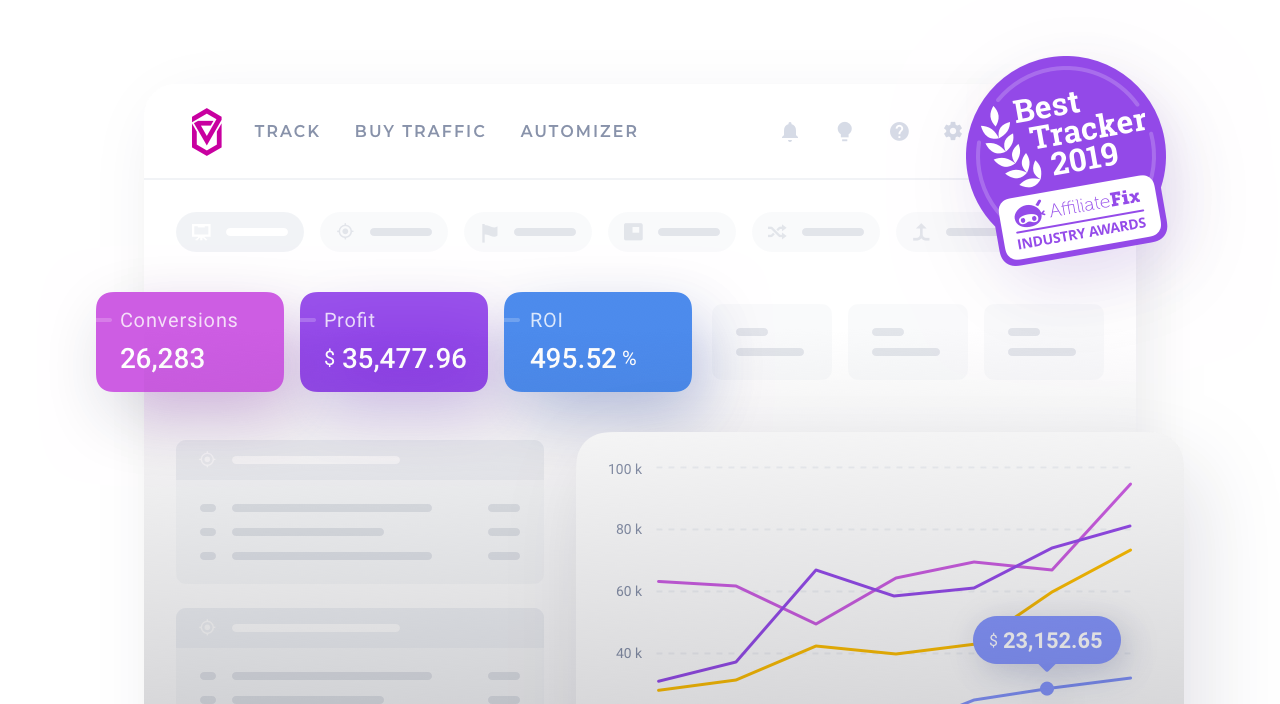Traffic Filtering: Applying IP / UA Rule
The following document describes how to use the Traffic filtering feature.
Voluum Note: Note that this feature requires having the first step of your campaign funnel ( ad -> campaign) set to redirect.

What is Traffic filtering and how is it used?
Traffic filtering allows you to add filtering rules based on
Voluum Info: Keep in mind that in order to rule out the majority of known automatic computer programs that might have an adverse effect on your traffic, Voluum combines the information from the third-party services and filters the traffic beforehand. If you need to block also other traffic events specific to your requirements, the best way of implementing it is to add the Traffic filtering rule.
The below steps present how to add a filtering rule for an IP range in Voluum and then, make it applicable to your traffic.
I. Add a Filtering Rule
To add a filtering rule to Voluum, perform the following steps:
- In Voluum, go to the Advanced module.
-
Go to the Traffic filtering tab. All the already existing filtering rules will be displayed on a table. If you have not added any rule, there will be no data in the table.

- Click the Add button. The New filtering rule pop-up window will show up.
- Provide a unique name for your rule in the Filter name field.
-
To add a list of IPs or user agent values, enter a single value per line:
-
Single IP address: Provide the address in the IP / IP range text field.
Voluum Info: You can only provide the IP addresses in compliance with the IPv4 format: 32 bits segmented into 4 octets. The IPv6 addresses cannot be added to Voluum.
- More than one IP address: Provide each address in a single line in the IP / IP range text field.
- IP range: Provide the IP range according to the following pattern: {IP_address} - {IP_address} . The addresses should be separated with a hyphen.
- Single user agent value: Provide the user agent substring in the User agent text field. The full user agent string is not required; hence the substring will suffice to successfully detect and apply the filtering rule.
- More than one user agent value: Provide each user agent substring in a single line in the User agent text field.
- (Addon) Voluum Traffic Filtering has an extra paid feature where you can filter out traffic based on parameters passed from a traffic source. You just need to enter parameter name and value in the
parameter=valueformat. If you want this feature to be included in your pricing plan, contact your account manager, sales representative or write an email to support@voluum.com.
-
-
Click the Save button.

- You have added the filtering rule to Voluum. Now, you need to enable it to make it applicable for your campaigns funnels.
II. Enable the Added Rule
Once the rule has been defined, you need to make it work:
- In the Traffic filtering tab verify if all the rules should be turned on to filter the traffic. If there is any rule that should not be applied, you need to delete it from the list.
- Turn on the toggle to activate all the filtering rules that are defined in the table. From now on, all the traffic will be filtered using the IP / UA rules.
To disable IP filtering, simply delete all rules.
Frequently Asked Questions:
Have more questions about adding the filtering rules? You might find the answer below:
Is there any limit of the filtering rules that can be added?
Yes, there is. You can add up to 50 filtering rules in the table. Moreover, for each rule you can define up to 50 lines either for the IP addresses / IP ranges or the user agents values.
How specifically should I define a user agent substring?
When adding a user agent value, you should provide the substring that is unique to the associated automatic computer program. Using generic values found within common user agents could result in filtering out of the valid traffic that is sent to your campaigns.
Could you explain what will happen when I provide the IP addresses and user agent substrings for one filtering rule?
If you provide values in both text fields, IP / IP range and User agent, for one filtering rule, all values will be applicable separately meaning that the traffic events will be blocked independently for each IP address (or the IP range) and user agent value.
Could you specify if the traffic will be excluded only from reporting or if Voluum blocks events that are defined by the filtering rule?
Voluum IP / UA Filtering excludes the added IP addresses, IP ranges, and UA values from accessing your campaigns and therefore, protects your statistics. However, it does not change any historical data. It also means that if you added the filtering rules based on the IP address (or IP range) specific for your organization, you would not be able to reach out your campaign URLs from the office.
I would like to exclude a wide range of IPs from my traffic using the filtering rule. May I specify only the IP address with its subnet mask?
Yes, you may.
Does IP Anonymization have an impact on IP / UA Filtering?
No. Even if you activate the IP Anonymization functionality, you can still filter out IP addresses that generate fake traffic. The functionality works normally in that case. To find out more, go to the General Settings: IP Anonymization article.
Can I exclude the traffic based on parameter values passed in the URL of the campaign?
To turn on the feature that allows you to filter out traffic based on parameter values, contact your account manager or use the support@voluum.com email address.


